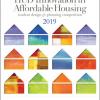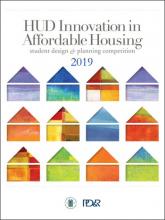0
Interactive
Community:
HUD’s Office of Policy Development and Research (PD&R) is pleased to announce the 2019 Innovation in Affordable Housing (IAH) Student Design and Planning Competition. The competition encourages multidisciplinary graduate student teams to submit innovative solutions for a real-world affordable housing project that incorporate design, planning, finance, and larger community elements.
Authored by: PD&R Edge Online Magazine
Topics: Funding, Housing, Low-income, Partnerships, Research
 Shared by Mica O'Brien
Shared by Mica O'Brien
Mica O'Brien posted a
on Oct 10, 2018
PD&R Edge Online Magazine
HUD’s Office of Policy Development and Research (PD&R) is pleased to announce the 2019 Innovation in Affordable Housing (IAH) Student Design and Planning Competition.
0
Interactive
Community:
This initiative is generating innovative ideas that will help us address the affordable housing crisis in America and further support our broad mission to create housing opportunities that are safe, sustainable, and affordable, while managing risk to protect lenders, homeowners, and taxpayers.
Specifically, The Challenge is a $10 million commitment by Fannie Mae to generate affordable housing solutions that will help Fannie Mae address the nation’s affordable housing issues by advancing sustainable communities–those providing residents integrated opportunities for employment, health and wellness, and education.
Authored by: Fannie Mae
Topics: Education, Funding, Health, Housing, Low-income, Workforce development
 Shared by Mica O'Brien
Shared by Mica O'Brien
Mica O'Brien posted a
on Oct 10, 2018
This initiative is generating innovative ideas that will help us address the affordable housing crisis in America and further support our broad mission to create housing opportunities that are safe, sustainable, and affordable, while managing risk to protect lenders, homeowners, and taxpayers.
Sp
0
Report
Community:
Jul 26, 2018
Neighborhoods where insecure housing overlaps with higher rates of emergency department use may be promising areas for interventions under Medicaid value-based payment
Authored by: United Hospital Fund
Topics: East Coast, Health, Housing, Low-income, Medicaid / Medicare, Partnerships, Stability
 Shared by Mica O'Brien
Shared by Mica O'Brien
Mica O'Brien posted a
on Oct 10, 2018
Neighborhoods where insecure housing overlaps with higher rates of emergency department use may be promising areas for interventions under Medicaid value-based payment
0
Report
Community:
Sep 1, 2018
The Roundtable brought together over 70 experts from federal, state, and local government, the private sector, nonprofit organizations, and academia. The objective of the Roundtable was to “explore possibilities and limits of data sharing, and identify successes and proposed solutions for using data to address the opioid crisis.”
Authored by: The Center for Open Data Enterprise
Topics: Data sharing, Health, Partnerships, Substance abuse
 Shared by Mica O'Brien
Shared by Mica O'Brien
Mica O'Brien posted a
on Oct 10, 2018
The Center for Open Data Enterprise
The Roundtable brought together over 70 experts from federal, state, and local government, the private sector, nonprofit organizations, and academia.
0
Publication
Community:
The health care system is transforming to deliver value and maximize health across a patient’s lifespan. In this new landscape, there is rapid adoption of health technology to deliver patient-centered, whole person care. This issue brief explores elements for technology applications emerging to “close the loop” between clinical and community services and presents accelerators and challenges to their adoption.
Authored by: Nemours Children's Health Systems
Topics: Child welfare, Data sharing, Early childhood, Health, Partnerships, Youth
 Shared by Mica O'Brien
Shared by Mica O'Brien
Mica O'Brien posted a
on Oct 10, 2018
Nemours Children's Health Systems
The health care system is transforming to deliver value and maximize health across a patient’s lifespan. In this new landscape, there is rapid adoption of health technology to deliver patient-centered, whole person care.
0
Webinar
Community:
Oct 8, 2018
During this All In webinar, Caroline Fichtenberg of SIREN reviewed the current landscape of assessment tools and outcomes measures for social needs. Karis Grounds of 2-1-1 San Diego explained how they incorporated social needs assessment into their Risk Rating Scale, which helps them better serve clients while showing the impact of their services.
Authored by: All In: Data for Community Health
Topics: Data sharing, Health, Low-income, Metrics, Partnerships, West Coast
 Shared by Mica O'Brien
Shared by Mica O'Brien
Mica O'Brien posted a
on Oct 10, 2018
All In: Data for Community Health
During this All In webinar, Caroline Fichtenberg of SIREN reviewed the current landscape of assessment tools and outcomes measures for social needs.
0
Webinar
Community:
Oct 8, 2018
A growing recognition of the importance of social determinants of health (SDOH) has led to a proliferation of screening and assessment tools, but there are currently no national standards for how to systematically capture and address the non-health needs of patients. To provide some guidance for communities just starting out on this path, All In: Data for Community Health hosted a webinar featuring two subject matter experts.
Authored by: All In: Data for Community Health
Topics: Data sharing, Health, Metrics, Partnerships
 Shared by Mica O'Brien
Shared by Mica O'Brien
Mica O'Brien posted a
on Oct 10, 2018
All In: Data for Community Health
A growing recognition of the importance of social determinants of health (SDOH) has led to a proliferation of screening and assessment tools, but there are currently no national standards for how to systematically capture and address the non-health needs of patients.
0
Webinar
Community:
Oct 9, 2018
CLPHA’s Education Working Group hosts a webinar with Bright by Text, a texting platform that connects caregivers with tools for improving educational outcomes for children. Bright by Text’s President and Senior Program Manager share information about their partnerships with housing authorities and non-profit housing providers across the country, providing insight into the benefits of connecting with residents through technology. CLPHA members who work with Bright by Text outline their respective initiatives and discussed local program goals.
Authored by: CLPHA
Topics: Child welfare, CLPHA, Dual-generation, Early childhood, Family engagement, Health, Home visiting, Housing, Housing Is Working Group, Partnerships, Place-based, Preventative care, Safety, School-readiness
 Shared by Mica O'Brien
Shared by Mica O'Brien
Mica O'Brien posted a
on Oct 10, 2018
CLPHA’s Education Working Group hosts a webinar with Bright by Text, a texting platform that connects caregivers with tools for improving educational outcomes for children.
0
Publication
Community:
Sep 1, 2018
This guide aims to provide resources and advice from the experiences of those in the NNIP network and other related organizations on developing a strong data governance program and protecting the security of confidential data.
Authored by: Leah Hendey, Amanda Gold, and Kathryn L.S. Pettit for National Neighborhood Indicators Partnership
Topics: Community development, Data sharing, Partnerships
 Shared by Mica O'Brien
Shared by Mica O'Brien
Mica O'Brien posted a
on Oct 10, 2018
Leah Hendey, Amanda Gold, and Kathryn L.S. Pettit for National Neighborhood Indicators Partnership
This guide aims to provide resources and advice from the experiences of those in the NNIP network and other related organizations on developing a strong data governance program and protecting the security of confidential data.
0
Podcast
Community:
Sep 12, 2018
Opportunity Zones have the potential to make a huge economic impact on disinvested communities across the country. Host Justin Milner speaks with researchers Brett Theodos and Brady Meixell on how this brand-new economic development initiative works, and how we’ll know if it’s truly successful.
Authored by: Urban Institute's Critical Value Podcast
Topics: Community development, Low-income, Mobility, Youth
 Shared by Mica O'Brien
Shared by Mica O'Brien
Mica O'Brien posted a
on Oct 10, 2018
Urban Institute's Critical Value Podcast
Opportunity Zones have the potential to make a huge economic impact on disinvested communities across the country. Host Justin Milner speaks with researchers Brett Theodos and Brady Meixell on how this brand-new economic development initiative works, and how we’ll know if it’s truly successful.
0
Case study
Community:
Sep 25, 2018
Practitioners working on community safety have increasingly incorporated creative placemaking techniques into their work. Creative placemaking refers to the ways in which arts and culture change how people use the places they share.
Authored by: Mark Treskon for Urban Institute
Topics: Community development, Criminal justice, Low-income, Out-of-school time, Partnerships, Place-based
 Shared by Mica O'Brien
Shared by Mica O'Brien
Mica O'Brien posted a
on Oct 10, 2018
Mark Treskon for Urban Institute
Practitioners working on community safety have increasingly incorporated creative placemaking techniques into their work. Creative placemaking refers to the ways in which arts and culture change how people use the places they share.
0
Research
Community:
May 1, 2018
The third in a series of Research-to-Impact briefs by Chapin Hall at the University of Chicago on understanding and addressing youth homelessness.
Authored by: Chapin Hall and Voices of Youth Count
Topics: Early childhood, Family engagement, Home visiting, Low-income, Partnerships, Pre-natal, Research, Youth
 Shared by Mica O'Brien
Shared by Mica O'Brien
Mica O'Brien posted a
on Oct 10, 2018
Chapin Hall and Voices of Youth Count
The third in a series of Research-to-Impact briefs by Chapin Hall at the University of Chicago on understanding and addressing youth homelessness.
0
Policy Brief
Community:
Oct 1, 2018
Authored by: SchoolHouse Connection
Topics: Child welfare, Early childhood, Education, Health, Homelessness, Low-income, Pre-natal
 Shared by Mica O'Brien
Shared by Mica O'Brien
Mica O'Brien posted a
on Oct 10, 2018
0
Publication
Community:
Young people are the workers of today and tomorrow. But those who become parents in their teenage years and early 20s, just as they are getting started in the world of work, are often confronted with a harsh reality: odds stacked against their ability to earn, learn and raise a family, which can threaten their children’s future as well as the strength of our communities.
Authored by: The Annie E. Casey Foundation
Topics: Early childhood, Education, Legislation & Policy, Post-secondary, Pre-natal, Research, Workforce development, Youth
 Shared by Mica O'Brien
Shared by Mica O'Brien
Mica O'Brien posted a
on Oct 10, 2018
The Annie E. Casey Foundation
Young people are the workers of today and tomorrow.
0
Policy Brief
Community:
This short document provides basic information to help housing and homeless assistance providers advocate with their families and youth for appropriate educational services, from birth through higher education. The rights and protections outlined here apply to all children and youth experiencing homelessness, as defined by the education subtitle of the McKinney-Vento Act.
Authored by: SchoolHouse Connection
Topics: Disabilities, Dual-generation, Early childhood, Education, Family engagement, Homelessness, Housing, Legislation & Policy, Low-income, Post-secondary, Youth
 Shared by Mica O'Brien
Shared by Mica O'Brien
Mica O'Brien posted a
on Oct 10, 2018
This short document provides basic information to help housing and homeless assistance providers advocate with their families and youth for appropriate educational services, from birth through higher education.
0
Interactive
Community:
Aug 20, 2018
Enhance your knowledge around family homelessness and the McKinney-Vento Homelessness Assistance Act's definition of "homeless" as it refers to children and youth. Review other relevant federal regulations for Head Start, Early Head Start, and Child Care and Development Fund (CCDF)-subsidized programs.
This interactive learning series is intended for professionals in Head Start, Early Head Start, and child care, including early childhood and school-age child care providers, CCDF Lead Agency or designated entity staff, and other key stakeholders. Learn how to identify families experiencing homelessness, conduct community outreach, and much more.
Authored by: U.S. Department of Health and Human Services, Administration for Children and Families
Topics: Child welfare, Early childhood, Education, Family engagement, Grade-level proficiency, Homelessness, Housing, Low-income, Stability
 Shared by Mica O'Brien
Shared by Mica O'Brien
Mica O'Brien posted a
on Oct 10, 2018
U.S. Department of Health and Human Services, Administration for Children and Families
Enhance your knowledge around family homelessness and the McKinney-Vento Homelessness Assistance Act's definition of "homeless" as it refers to children and youth.
0
News Article
Community:
Oct 8, 2018
A strategy for community problem-solving does an extraordinary job at restoring our social fabric.
Authored by: David Brooks for The New York Times
Topics: Community development, Education, Partnerships, Place-based, Youth
 Shared by Mica O'Brien
Shared by Mica O'Brien
Mica O'Brien posted a
on Oct 10, 2018
David Brooks for The New York Times
A strategy for community problem-solving does an extraordinary job at restoring our social fabric.
0
Research
Community:
Oct 1, 2018
Although the rental assistance programs varied, key themes emerged, including (1) most programs, recognizing the impact of housing stability on health outcomes, targeted populations served by state or local health and human services programs; (2) most programs served a growing number of households over time; (3) funding generally increased over time and most of it came from general revenue; and (4) programs involved collaboration between the housing and health and human services agencies to ensure clients’ needs were comprehensively met.
Authored by: Anna Bailey, Peggy Bailey, and Douglas Rice for the Center on Budget and Policy Priorities
Topics: Funding, Health, Housing, Legislation & Policy, Low-income, Partnerships, Place-based, Research, Stability
 Shared by Mica O'Brien
Shared by Mica O'Brien
Mica O'Brien posted a
on Oct 9, 2018
Anna Bailey, Peggy Bailey, and Douglas Rice for the Center on Budget and Policy Priorities
Although the rental assistance programs varied, key themes emerged, including (1) most programs, recognizing the impact of housing stability on health outcomes, targeted populations served by state or local health and human services programs; (2) most programs served a growing number of households o
0
News Article
Community: Postsecondary
Oct 2, 2018
An organization is using the influence that teenagers have on their contemporaries to help more students from low-income families gain college admission and student aid.
Authored by: David Bornstein for The New York Times
Topics: Education, Low-income, Mental health, Post-secondary, Stability, Youth
 Shared by Mica O'Brien
Shared by Mica O'Brien
Mica O'Brien posted a
on Oct 9, 2018
David Bornstein for The New York Times
An organization is using the influence that teenagers have on their contemporaries to help more students from low-income families gain college admission and student aid.
0
Webinar
Community:
Sep 26, 2018
The Colorado Coalition for the Homeless (CCH) has been investing in supportive housing since 1990. Since that time, this comprehensive community health center has developed nearly 1,700 units of housing, and is one of the country’s leaders in integrating health care and housing for a vulnerable population.
This webinar discusses how CCH finances its capital development; how they plan, design, and manage multiple projects simultaneously; how they integrate housing and health care services; and how they include property management staff in a coordinated approach to care. This conversation with members of CCH’s leadership complements our recent policy brief and included time for audience Q&A.
Authored by: National Health Care for the Homeless Council
Topics: Health, Homelessness, Low-income, Medicaid / Medicare, Mental health, Pacific Northwest, Place-based, Supportive housing
 Shared by Mica O'Brien
Shared by Mica O'Brien
Mica O'Brien posted a
on Oct 9, 2018
National Health Care for the Homeless Council
The Colorado Coalition for the Homeless (CCH) has been investing in supportive housing since 1990.
0
News Article
Community:
Oct 5, 2018
At a recent symposium convened by Capital One in Plano, Texas, practitioners, researchers, funders, business leaders, technologists, and other stakeholders discussed ways local leaders can harness technology and data to increase access to opportunity. This issue is particularly relevant in the Dallas metropolitan area, which is one of the country’s fastest-growing tech hubs yet still struggles with a lack of economic and racial inclusion.
Authored by: Aaron Shroyer, Solomon Greene, and Emily Peiffer for Urban Institute
Topics: Broadband, Low-income, Place-based
 Shared by Mica O'Brien
Shared by Mica O'Brien
Mica O'Brien posted a
on Oct 5, 2018
Aaron Shroyer, Solomon Greene, and Emily Peiffer for Urban Institute
At a recent symposium convened by Capital One in Plano, Texas, practitioners, researchers, funders, business leaders, technologists, and other stakeholders discussed ways local leaders can harness technology and data to increase access to opportunity.
0
News Article
Community:
Oct 2, 2018
Students have around 60 programs at their disposal, from advanced manufacturing to emergency medical response.
Authored by: Heather Burian for CT
Topics: East Coast, Education, Food insecurity, Health, Low-income, Post-secondary, Youth
 Shared by Mica O'Brien
Shared by Mica O'Brien
Mica O'Brien posted a
on Oct 4, 2018
Students have around 60 programs at their disposal, from advanced manufacturing to emergency medical response.
0
Research
Community:
Oct 3, 2018
Using administrative data from Massachusetts, this study analyzes the health care use and Medicaid expenditures of families who experienced one or more homeless episodes between 2008 and 2015 to investigate how health care use is related to emergency housing experiences.
Authored by: Urban Institute
Topics: Asthma, Child welfare, Depression, Health, Homelessness, Housing, Low-income, Medicaid / Medicare, Metrics, Pre-natal, Research
 Shared by Mica O'Brien
Shared by Mica O'Brien
Mica O'Brien posted a
on Oct 4, 2018
Using administrative data from Massachusetts, this study analyzes the health care use and Medicaid expenditures of families who experienced one or more homeless episodes between 2008 and 2015 to investigate how health care use is related to emergency housing experiences.
0
News Article
Community:
Sep 27, 2018
Nationally, resources for providing families with housing assistance are inadequate. DC is piloting a new approach, the DC Flexible Rent Subsidy Program (DC Flex), to test whether shallow (smaller than the average subsidy, over a defined period) and flexible subsidies can help more families maintain affordable, adequate housing.
Authored by: Mychal Cohen and Josh Leopold for Urban Institute
Topics: Cost effectiveness, East Coast, Housing, Low-income, Research, Stability
 Shared by Mica O'Brien
Shared by Mica O'Brien
Mica O'Brien posted a
on Oct 4, 2018
Mychal Cohen and Josh Leopold for Urban Institute
Nationally, resources for providing families with housing assistance are inadequate.











 Shared by Iyen Acosta
on Sep 27, 2018
Shared by Iyen Acosta
on Sep 27, 2018
